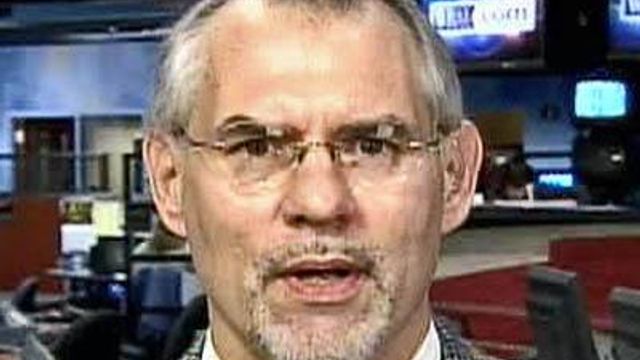Wachovia loses $8.9B, cuts 6,350 workers
Wachovia Corp. reported a surprisingly large second-quarter loss Tuesday, deflating Wall Street's hopes that the nation's big banks are weathering the credit crisis well.
Posted — UpdatedThe bank said it lost $8.86 billion, is slashing its dividend and eliminating 10,750 positions – 4,400 jobs are open or are outside contractors – after losses tied to mortgages soared.
Even excluding one-time items, the results substantially missed analysts' estimates.
By the afternoon, Wachovia's stock joined a modest Wall Street rally and rose as much as 13 percent – its shares had sunk to mid-1991 levels in pre-market trading – after Chief Executive Bob Steel said he plans to cut $2 billion in expenses by the end of next year and sell parts of the fourth-largest U.S. bank.
"Our reported results today are clearly a disappointing performance for which we take responsibility," Steel said during a conference call with analysts. "We are serious about getting on top of these issues quickly, and we believe we have a good grasp of the challenges facing the economy, the industry and Wachovia."
Steel said the company was moving to "sell selected non-core assets" and reduce the number of business customers who only use the bank for loans rather than other services. Wachovia expects to cut expenses during the second half of this year by $490 million and then reduce 2009 spending by $1.5 billion.
As part of that plan, the bank plans to lay off 6,350 workers, affecting more than 5 percent to fits roughly 120,000 employees. A majority of those jobs would come from the mortgage area, Steel said.
The bank has already cut 2,000 retail mortgage jobs.
Wachovia employs 31,000 people in North Carolina, including 2,000 in the Triangle area, but a spokeswoman said the region likely wouldn't bear the brunt of the layoffs.
Still, the bank's difficulties will ripple across the state, according to Mike Walden, an economist at North Carolina State University.
"Just the fact that Wachovia is bleeding money rather than making money is going to hurt the state economy," Walden said. "I would not expect to see any kind of massive losses by customers at Wachovia. I think the losses, obviously, are with investors and potentially, unfortunately, with employees."
Wachovia said it lost the equivalent of $4.20 per share in the April to June period. In the same time frame last year, the bank earned $2.34 billion, or $1.22 per share.
Excluding $6.1 billion in write-downs to the value of its intangible assets and merger-related and restructuring charges of $128 million, Wachovia lost $2.67 billion, or $1.27 per share. Second quarter results include the bank's October acquisition of A.G. Edwards Inc., which the bank said the merger is proceeding as planned and is 40 percent complete.
Analysts on average expected a loss of 78 cents per share on revenue of almost $8.4 billion.
Earlier this month, the Charlotte-based bank had projected a $2.6 billion to $2.8 billion quarterly loss, equal to $1.23 to $1.33 per share, excluding goodwill items.
"Wachovia's new management has pulled its head of out the sand and is fully acknowledging the problems not challenges," said Bart Narter, senior analyst at Celent, a Boston-based financial research and consulting firm. "While the company's wealth management, corporate and investment banks, and capital management groups all had more encouraging results than the general bank, the general bank is the bulk of Wachovia and it isn't performing well."
Wachovia cut its quarterly dividend to 5 cents per share from 37.5 cents, which will conserve approximately $700 million of capital per quarter. In April, Wachovia slashed its dividend 41 percent.
Steel, who replaced ousted Ken Thompson earlier this month, said it was "clearly prudent and necessary" to further cut the dividend.
"While this is a difficult decision, it is the best course for our shareholders over the long term," he said.
Results also included a $975 million charge related to the tax treatment of leveraged leases, $936 million of losses from disrupted capital markets, a $590 million charge for other legal matters, and $391 million of losses on securities sales.
Wachovia's current problems stem largely from its acquisition of mortgage lender Golden West Financial Corp. in 2006 for roughly $25 billion at the height of the nation's housing boom. With that purchase, Wachovia inherited a deteriorating $122 billion portfolio of Pick-A-Payment loans, Golden West's specialty, which let borrowers skip some payments.
During the quarter, the Wachovia boosted its provision for loan losses to $5.57 billion from $179 million a year ago, and added $4.2 billion to its reserves for bad loans.
Wachovia's increase in loan loss reserves included $3.3 billion related to the "Pick-a-Payment" mortgage portfolio. In April, the bank tightened underwriting standards, and last month it stopped offering an option on "Pick-A-Payment" loans that let borrowers pay less than the interest owed. On Monday, Wachovia said it will stop offering home loans through brokers.
Wachovia said it is setting aside $10.96 billion for credit losses, up from $6.77 billion in the first quarter and $3.55 billion a year earlier. Net charge-offs, loans it doesn't think are collectable, increased more than eight-fold from a year earlier to $1.31 billion.
Profits in consumer and business banking, Wachovia's largest unit, fell 23 percent to $1.12 billion, hurt by rising credit costs, mainly for mortgages.
The corporate and investment banking unit had a $209 million profit, down 73 percent, reflecting write-downs tied to sub-prime mortgages, commercial mortgages, non-sub-prime debt and consumer mortgages.
Capital management profit fell 5 percent to $297 million, hurt by the liquidation of an Evergreen Investments fund, while wealth management profit rose 9 percent to $98 million.
Moody's Investors Service, Standard & Poor's and Fitch Ratings downgraded their ratings on Wachovia's debt, citing increased expectations of losses in the bank's mortgage portfolio and its reduced flexibility to raise new capital.
Copyright 2024 by WRAL.com and the Associated Press. All rights reserved. This material may not be published, broadcast, rewritten or redistributed.





